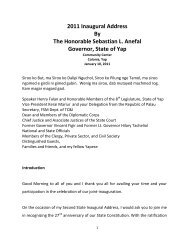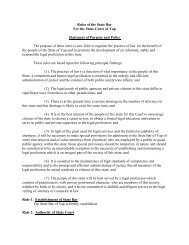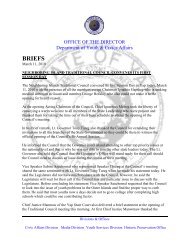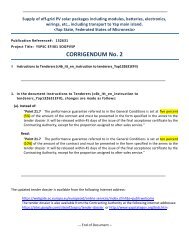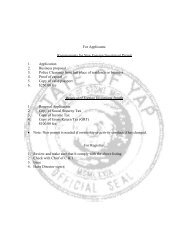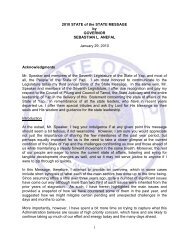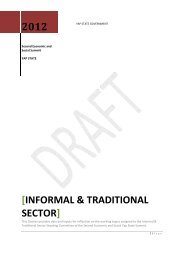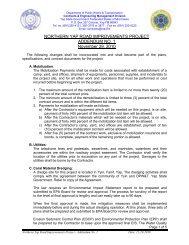RULES OF CIVIL PROCEDURE For the Trial Division of the Yap ...
RULES OF CIVIL PROCEDURE For the Trial Division of the Yap ...
RULES OF CIVIL PROCEDURE For the Trial Division of the Yap ...
Create successful ePaper yourself
Turn your PDF publications into a flip-book with our unique Google optimized e-Paper software.
If <strong>the</strong> motion is granted in part and denied in part, <strong>the</strong> court may apportion <strong>the</strong><br />
reasonable expenses incurred in relation to <strong>the</strong> motion among <strong>the</strong> parties and persons in a<br />
just manner.<br />
(b) Failure to Comply with Order.<br />
(1) Sanctions by <strong>the</strong> Court. If a deponent fails to be sworn or to answer a question<br />
after being directed to do so by <strong>the</strong> court, <strong>the</strong> failure may be considered a contempt <strong>of</strong><br />
court.<br />
(2) Sanctions by Court in Which Action is Pending.<br />
If a party or an <strong>of</strong>ficer, director, or managing agent <strong>of</strong> a party or a person designated<br />
under Rule 30(b)(6) or 31(a) to testify on behalf <strong>of</strong> a party fails to obey an order to<br />
provide or permit discovery, including an order made under subdivision (a) <strong>of</strong> this rule or<br />
Rule 35, or if a party fails to obey an order under Rule 26(f), <strong>the</strong> court may make such<br />
orders in regard to <strong>the</strong> failure as are just, and among o<strong>the</strong>rs <strong>the</strong> following:<br />
(A) An order that <strong>the</strong> matters regarding which <strong>the</strong> order was made or any o<strong>the</strong>r<br />
designated facts shall be taken to be established for <strong>the</strong> purposes <strong>of</strong> <strong>the</strong> action in<br />
accordance with <strong>the</strong> claim <strong>of</strong> <strong>the</strong> party obtaining <strong>the</strong> order;<br />
(B) An order refusing to allow <strong>the</strong> disobedient party to support or oppose<br />
designated claims or defenses, or prohibiting him from introducing designated matters in<br />
evidence;<br />
(C) An order striking out pleadings or parts or fur<strong>the</strong>r proceedings until <strong>the</strong><br />
order is obeyed, or dismissing <strong>the</strong> action or proceeding or any part or rendering a<br />
judgment by default against <strong>the</strong> disobedient party;<br />
(D) In lieu <strong>of</strong> any <strong>of</strong> <strong>the</strong> foregoing orders or in addition <strong>the</strong>reto, an order<br />
treating as a contempt <strong>of</strong> court <strong>the</strong> failure to obey any orders except an order to submit to<br />
a physical or mental examination;<br />
(E) Where a party has failed to comply with an order under Rule 35(a)<br />
requiring him to produce ano<strong>the</strong>r for examination, such orders as are listed in paragraphs<br />
(A), (B), and (C) <strong>of</strong> this subdivision, unless <strong>the</strong> party failing to comply shows that he is<br />
unable to produce such person for examination.<br />
In lieu <strong>of</strong> any <strong>of</strong> <strong>the</strong> foregoing orders or in addition.<strong>the</strong>reto, <strong>the</strong> court shall require <strong>the</strong><br />
party failing to obey <strong>the</strong> order, <strong>the</strong> counsel advising him or both to pay <strong>the</strong> reasonable<br />
expenses, including counsel, caused by <strong>the</strong> failure, unless <strong>the</strong> court finds that <strong>the</strong> failure<br />
was substantially justified or that o<strong>the</strong>r circumstances make an award <strong>of</strong> expenses unjust.<br />
(c) Expenses on Failure to Admit. If a party fails to admit <strong>the</strong> genuineness <strong>of</strong> any<br />
document or <strong>the</strong> truth <strong>of</strong> any matter as requested under Rule 36, and if <strong>the</strong> party<br />
requesting <strong>the</strong> admissions <strong>the</strong>reafter proves <strong>the</strong> genuineness <strong>of</strong> <strong>the</strong> document or <strong>the</strong> truth<br />
<strong>of</strong> <strong>the</strong> matter, he may apply to <strong>the</strong> court for an order requiring <strong>the</strong> o<strong>the</strong>r party to pay him



